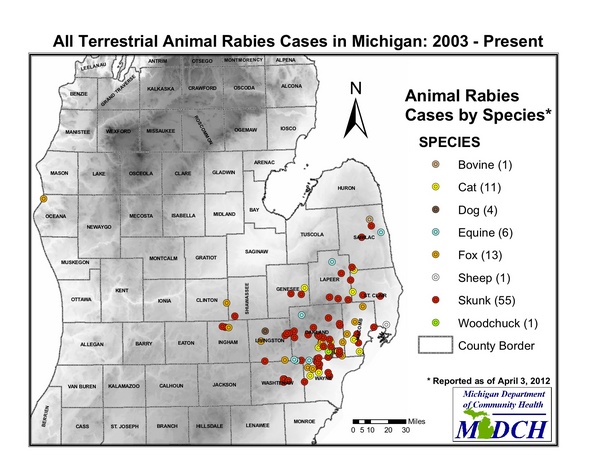Recent cases of rabid skunks part of statewide concern

Courtesy of Michigan Department of Community Health
Previous story: Four skunks with rabies identified in Ann Arbor this year
The spike in recently reported cases of skunks with rabies within Ann Arbor city limits are indicative of a growing concern across Michigan, according to statewide health data.
Four rabid skunks have been reported in Ann Arbor this year, bringing the total to seven since last fall. That follows a five-year span when Washtenaw County reported zero rabid skunks.
According to a map of rabies incidences by species, excluding bats, from 2003 to present compiled by the Michigan Department of Community Health, skunks have the highest incidence of rabies by a significant margin.
Officials are warning residents to be cautious if they see one in the area.
The Humane Society of Huron Valley has a 24-hour rescue and cruelty line for injured wild or domestic animals at (734) 661-3512.
Deb Kern, marketing director for the Humane Society, said the 24-hour hotline should be the first number people call if they suspect a skunk or other animal to be rabid.
Skunks are typically active at dusk, nighttime or in the early morning hours.
Elise Ramsey, cruelty investigator for the Humane Society, said the rate of disease spread tends to be higher in the springtime.
Ramsey offered the following tips to tell if an animal is acting sick:
- No fear of humans or other animals
- Aggressive
- Drooling or foaming at the mouth
- Appear to be paralyzed
- Walk in circles
- Active during daylight hours
Animals that have not received a vaccination against rabies will die if bitten by a rabid animal.
Amy Biolchini covers Washtenaw County, health and environmental issues for AnnArbor.com. Reach her at (734) 623-2552, amybiolchini@annarbor.com or on Twitter @amywrites_.


Comments
fairfield
Mon, May 14, 2012 : 3:05 a.m.
Shouldn't the Health Department do something about stray cats, those that are abandoned as well as those who are allowed to roam around freely by their owners?
tdw
Sat, May 12, 2012 : 6:16 p.m.
They make cool looking hats
hmsp
Sat, May 12, 2012 : 9:03 p.m.
There was a kayaker I used to run into out at Delhi, back in the 80s, who had a skunk pelt glued to his helmet...